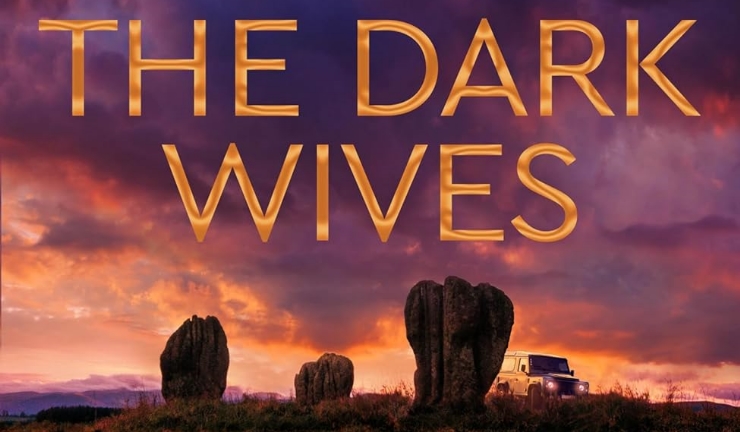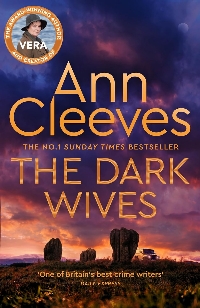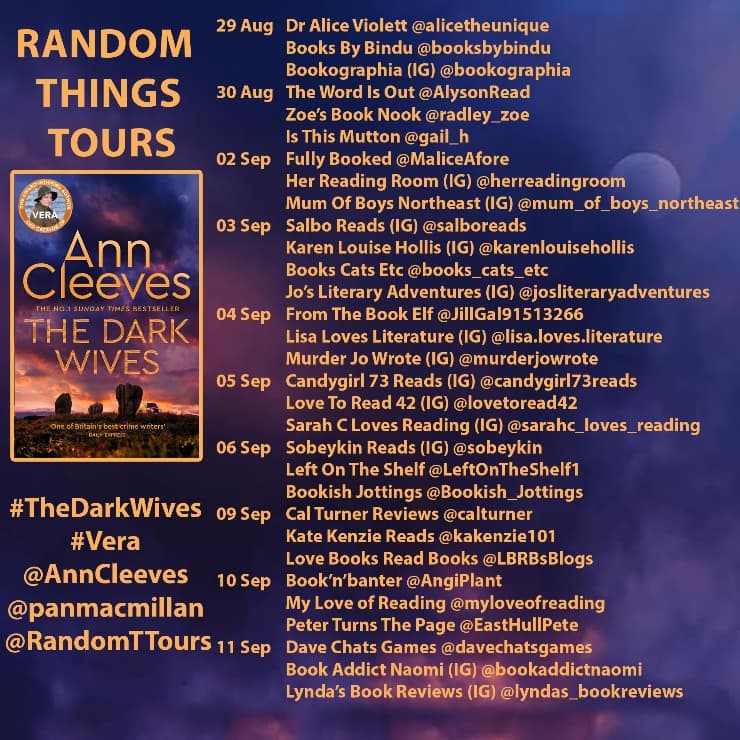Blog tour: The Dark Wives by Ann Cleeves

This post is part of a blog tour organised by Random Things Blog Tours. I received a free copy of the book in return for an honest review.
‘The man’s body is found in the early morning light by a local dog walker on the common outside Rosebank, a care home for troubled teens. The victim is Josh, a staff member, who was due to work the previous night but never showed up.
‘DCI Vera Stanhope is called out to investigate the death. Her only clue is the disappearance of one of the home’s residents, fourteen-year-old Chloe Spence. Vera can’t bring herself to believe that a teenager is responsible for the murder, but even she can’t dismiss the possibility.
‘Vera, Joe and new team member Rosie Bell are soon embroiled in the case, and when a second connected body is found near the Three Dark Wives standing stones in the wilds of the Northumbrian countryside, superstition and folklore begin to collide with fact.
‘Vera knows she has to find Chloe to get to the truth, but it seems that the dark secrets in their community may be far more dangerous than she could ever have believed possible.’

In The Dark Wives, by Ann Cleeves, DCI Vera Stanhope and her team are tasked with solving the murder of Josh Woodburn, a university student who works part-time in a children’s home, and the subsequent disappearance of Chloe Spence, one of the four teenagers who live in the home.
With little to go on, the detectives are forced to cast their net wide, with interviewees ranging from Josh’s colleagues and charges, to his personal contacts, to the people at the top of the children’s home and Chloe’s school – the former run by a private company, the latter an academy funded by a local businesswoman.
When a second victim is discovered, it becomes even more imperative to find Chloe and apprehend the killer. Unless they’re one and the same – which is highly unlikely – Chloe is in grave danger because she knows something she shouldn’t.
I’m always excited to read a new Vera novel, and this was a particularly good one that I absolutely galloped through, because there was just so much for the team (and therefore the reader) to uncover and unravel.
Following the tragic events of The Rising Tide, the DCI is in an unusually self-reflective and self-critical frame of mind. Even so, she retains her compelling straight-talking manner and gift for observation, and while she tries to work more collaboratively, she can’t seem to help but take at least some of the best jobs and keep her team somewhat in the dark about what she’s thinking.
I was more or less immediately won over by new team member Rosie, who has both spark and warmth. She’s necessarily very different to her predecessor, Holly, and it was refreshing to see a change in the team dynamic, as well as what an “outsider” makes of Vera’s management style.
Vera has always been isolated, and her experiences growing up as the unloved daughter of a difficult widower are well-established, but her recent cogitations and the facts of this case really bring these aspects of her character to the forefront in this instalment.
Chloe is in care because her mother is ill, her father walked out on the family for a new life in Dubai a few years previously, and she doesn’t get along with her grandparents because they disapprove of her Gothic look. The teachers at her school only care about grades and rules, and Josh – the only person she felt seen by – is dead. It’s clear from the first time Vera reads Chloe’s diary that she identifies and sympathises with her.
In fact, Vera takes a compassionate, generous view of all the young people involved in the case, whether that’s the troubled teens in the home or Chloe’s more fortunate friends. She directs her frustration and disapproval (rightly) towards the systems that have failed them: the lack of support that made Chloe a young carer; the school that focusses on appearances rather than its pupils’ wellbeing; the outsourced “care” companies who prioritise profits over their vulnerable users and overworked staff. These themes make this a very timely novel.
At the same time, the dark, brooding atmosphere of the rural north and echoes of the past that characterise this series are very much present. The titular ‘Dark Wives’ are a set of standing stones which, legend has it, were crones who were petrified by a giant for the crime of being too talkative and “uppity”.
The events of the story coincide with the neighbouring village of Gillstead’s annual “Witch Hunt”, where local children and teenagers gather at the stones in the dark and have to catch a resident dressed as a witch before she catches them. It transpires that Chloe herself has connections with Gillstead, as her grandfather grew up on, inherited, and eventually sold a farm there – its subsequent transformation into a holiday home another symptom of economic and social change.
The Dark Wives is gripping, atmospheric, and timely.
